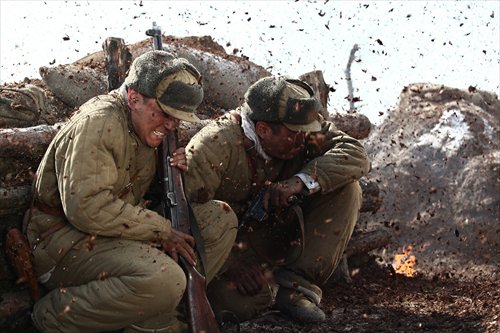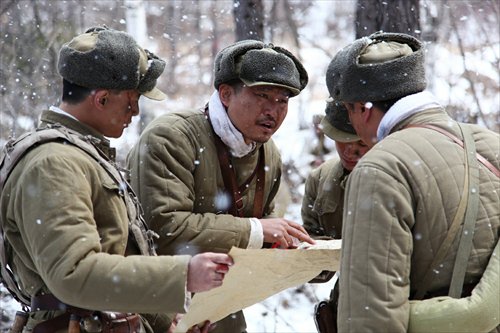New Chinese TV series breaks nation’s silence on the Korean War

Scenes from The 38th Parallel Photos: IC

Scenes from The 38th Parallel Photos: IC
Featuring a subject that had been forbidden for years, China's first Korean War TV series hit small screens throughout the nation on May 28.
The 38th Parallel starts when fishermen along the Yalu River, which borders China and what is now North Korea, are attacked by a US fighter bomber in 1950. The series follows the trials and difficulties faced by two young Chinese men who volunteer to fight in Korea after they survive the attack.
This is the first time that a TV drama about the Korean War, or The War to Resist US Aggression and Aid Korea as it is called in China, has graced TV screens in the country for the past 16 years.
Looking to stay historically accurate, the series brought on PLA General Liu Yuan and Major General Qin Tian, whose father General Qin Jiwei was the Chinese commander at the Battle of Triangle Hill, as consultants.
Introducing history
Considering the country's strict review and approval system, film and television works have always been a good indicator of how the political winds in China are blowing. Taking stable Sino-US relations into account, no TV series on the Korean War have been allowed to air since 2000.
However, while the debut of The 38th Parallel might be seen as having political connotations, those involved in the series insist that is not the case.
"The 38th Parallel is not a way to brag but a way to show our respect for the accomplishments of older generations in history," the show's director, Meng Ji, was quoted as saying in an article by takungpao.com.
According to a report by thepaper.cn, the show's producer Wang Pei also said at a conference held in Beijing that all they want is for "audiences to get to know the stories from those years," a mission that the crew sees as their responsibility to both veterans of the war and society as a whole.
The historical background of the Korean War is extremely complex as it involved numerous battles and intertwined relationships between China, North Korea, the Soviet Union and the US.
"This phase of history has seldom been shown directly," Yin Hong, executive vice-president of Tsinghua University's school of Journalism and Communication, told the Global Times.
"I feel they are doing this to remind audiences not to forget the past. There is no political background," he said.
Zhang Yiwu, a critic and cultural scholar at Peking University, holds a similar opinion.
"The show is mainly talking about ordinary people, depicting an important event in Chinese history without meaning any opposition."
"It's just like how the US talks about the attack on Pearl Harbor," he told the Global Times.
Sensitive relations
According to takungpao.com, China Centeral Televison, CCTV once filmed a 30-episode TV series The War to Resist US Aggression and Aid Korea back in 2000. The show was supposed to air the following year, but never saw the light of day.
According to Yang Weiguang, former president of CCTV, in the same report on takunpao.com, after the September 11 attacks, the Ministry of Foreign Affairs felt it was necessary to be careful when it came to Sino-US relations.
"Considering the situation when the World Trade Center was destroyed, it would have been inappropriate to present The War to Resist US Aggression and Aid Korea. Therefore we didn't broadcast it," Yang said.
This was not the only time a Korean War drama was stopped in its tracks.
General Zhao Nanqi, once a translator for Commander and Commissar of the People's Volunteer Army Peng Dehuai during the war, once produced a movie titled 38th Parallel North, but the film never made it to theaters.
Later in 2013, Zhao got approval to shoot a TV series to tell Peng Dehuai's story, but this too never came to fruition. According to the show's scriptwriter Ma Jihong, this was because that content releated to the Korean War was still too sensitive at the time.
While The 38th Parallel does indicate that the Korean War is no longer off limits, Zhang did point out that the show avoids politically sensitive content such as decisions made by high-level leaders.
Yin also noted that the show may have been given the green-light because of its focus on ordinary soldiers and their sacrifices "induces more humanitarian feelings in viewers against war and reminds people of the hurt it may cause."
Newspaper headline: Approaching the 38th parallel